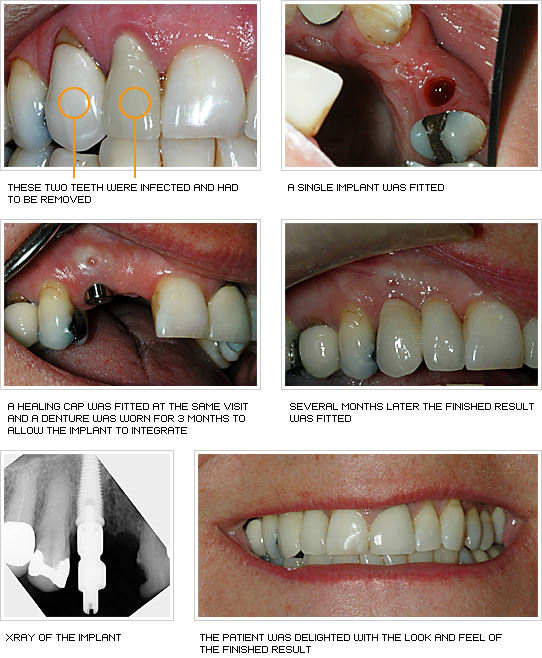An Unbiased View of Dental Sense
Table of ContentsThe Greatest Guide To Dental SenseDental Sense for BeginnersThe Best Strategy To Use For Dental SenseSome Ideas on Dental Sense You Need To Know
are medical tools surgically implanted into the jaw to restore a person's ability to eat or their appearance. They supply assistance for artificial (phony) teeth, such as crowns, bridges, or dentures. When a tooth is lost due to injury or disease, a person can experience issues such as quick bone loss, faulty speech, or adjustments to chewing patterns that lead to pain.Oral implant systems contain an oral implant body and oral implant abutment and might additionally include an abutment addiction screw. Front tooth filling. The oral implant body is operatively placed in the jawbone instead of the tooth's origin. The oral implant abutment is generally connected to the dental implant body by the abutment addiction screw and extends through periodontals into the mouth to support the affixed synthetic teeth
(https://writeablog.net/dentalsense1/expert-solutions-for-wisdom-tooth-cavities-and-same-day-dental-implants)Structure of The Dental Implant System selecting dental implants, speak to your dental company concerning the prospective benefits and threats, and whether you are a prospect for the procedure. Points to think about: Your overall health is an essential factor in establishing whether you are a great candidate for oral implants, how long it will certainly take to heal, and for how long the implant may remain in location.
Smoking cigarettes might influence the recovery procedure and decrease the lasting success of the implant. The recovery procedure for the dental implant body may take numerous months or longer, during which time you normally have a short-term joint in area of the tooth. the dental implant treatment: Thoroughly adhere to the oral hygiene directions offered to you by your oral supplier.
7 Easy Facts About Dental Sense Shown
Implant failing can lead to the need for an additional operation to fix or change the implant system. Restores the ability to eat Brings back aesthetic look Assists maintain the jawbone from shrinking because of bone loss Maintains the wellness of the surrounding bone and gum tissues Aids maintain nearby (neighboring) teeth steady Enhances lifestyle Damage to surrounding natural teeth during implant placement Injury to the surrounding tissues during surgical procedure, such as sinus perforation Injury during surgical treatment (as an example, fracture of bordering jawbone) Insufficient function, such as feeling like the teeth do not bite together generally A sensation that the tooth is loose or turning in location resulting from an abutment screw loosening up Implant body failure (looseness of the implant body) due to systemic infection, which may be most likely in individuals with unchecked diabetes mellitus as a result of local infection in bone and gums supporting the dental implant body as a result of delayed recovery, which might be most likely in patients that smoke Trouble cleaning the gum tissues around the dental implant, resulting in inadequate oral hygiene Untreated gum disease Post-surgical numbness because of nerve impingement or damage Always notify wellness treatment service providers and imaging professionals that you have oral implants prior to any type of magnetic vibration imaging (MRI) or x-ray treatments.
FDA is not familiar with any negative events reported for MRI or x-ray procedures with dental implants. Oral implants systems are commonly made from products that follow global agreement standards of the International Company for Standardization (ISO) or ASTM International. These standards have information of what makes a safe material.

An oral implant is a structure that changes a missing out on tooth. With screw-like tools, the surgeon inserts a dental implant into the jawbone, and it acts as a support for an artificial tooth, called a crown.
The 7-Minute Rule for Dental Sense
Some people are not eligible for dental implant surgical treatment. It is for oral cosmetic surgeons to operate on individuals with: severe illnessuncontrollable metabolic diseasebone or soft cells condition or infectionIf these problems are solved, an individual can have the surgical procedure. In, dental specialists avoid operating people with: If individuals with any of the above undergo oral implant surgical treatment, there is a greater danger of the implant failing.

Dental dental implant surgical procedure is a tailored process. Offer you time to heal. Attach the article and final go to my site crown, bridge or denture.
Next, your surgeon will very carefully position the oral implant right into your jaw. If your dental implant is near the front of your mouth, your dental expert will make a momentary tooth for you to use up until you recover.
The 25-Second Trick For Dental Sense
Throughout the healing stage, your jawbone needs to fuse to the oral implant. This procedure can take anywhere from 3 to 9 months.
Once your dental implant heals, your dentist can connect the joint (tiny connector article) and your final repair (crown, bridge or denture). This normally takes regarding one hour to complete and may require a second small surgical procedure. You shouldn't feel any type of pain during your dental implant procedure due to the fact that your company will use medicine to numb your periodontals.